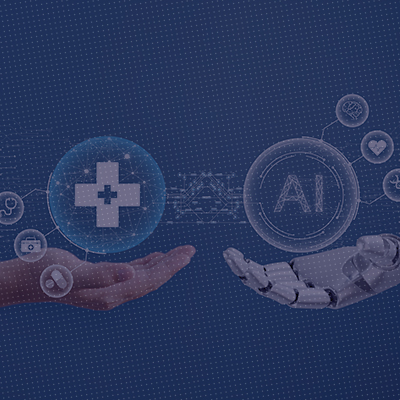The global healthcare industry is experiencing growth, with India emerging as a particularly dynamic market. This expansion stems from increasing needs for sophisticated diagnostic capabilities, optimized treatment methodologies, and personalized patient care approaches. A catalyst accelerating this transformation is the growing adoption of artificial intelligence (‘AI’) systems, which are fundamentally reshaping traditional healthcare delivery paradigms. Recent investment trends reflect a strong pivot toward AI-driven healthcare solutions. Investors are actively funding startups and platforms focused on AI-based diagnostics, predictive analytics for early disease detection, virtual health assistants, and automation of hospital operations. There’s also increasing capital flow into AI applications in mental health, chronic care management, and population health analytics. Strategic collaborations between technology firms and healthcare providers are becoming more common, alongside M&A activity targeting scalable AI health tech assets.
The integration of AI technologies in diagnostics, drug development, and healthcare administration is driving the creation of scalable solutions, strengthening India’s role as a key destination for strategic investment in the healthcare sector. As a result, it is increasingly attracting strategic acquisitions, with investors particularly in AI healthcare assets that can address systematic gaps in healthcare delivery.
The increase of AI-powered healthcare solutions in India is both driven by and is responsive to the nation's unique demographic challenges. With a vast, diverse population and a strained patient-to-provider ratio, these technologies would help bridge critical gaps in healthcare accessibility. Particularly, in remote and underserved regions where traditional medical services remain scarce, AI-enabled solutions shall prove to be transformative. Indian enterprises are engaging in developing AI-enabled solutions across diagnostics, clinical trials, pharmaceutical innovation, patient monitoring, and healthcare revenue cycle management, which are also increasingly attracting global investment interest. Hospitals and clinics can specifically employ AI tools to record medical history, physical examination notes, virtual consultations, regional language assistance tools to eradicate barriers in communication, and other operational functions such as inventory management, maintenance of equipment and predictive medical analysis trained with machine learning. These AI solutions significantly reduce procedural and administrative burden on healthcare service providers and enable them to allocate more time for diagnosis and direct patient care. Further, there has been an increased usage of AI in diagnostics wherein diagnostic AI tools are aiding in disease detection through early identification of conditions, automating image analysis and lab test interpretation.
The recent uptick of activity in AI-driven healthcare firms signals the healthcare industry’s inclination to propel strategic action through technology-based mergers and acquisitions. Private equity and venture capital investors are increasingly funding such enterprises, drawn by their scalable operations, capital-efficient business models, and diminished dependence on traditional systems.
While India currently lacks an AI-specific healthcare legislation, the regulatory framework in India is evolving to support AI integration within healthcare, policy initiatives such as the Ayushman Bharat Digital Mission and National Digital Health Blueprint are laying the foundation for robust digital healthcare infrastructure. Existing data privacy regulations govern artificial intelligence applications in the sector and the Information Technology Act, 2000, the Information Technology (Reasonable Security Practices and Procedures and Sensitive Personal Data or Information) Rules, 2011 and India’s Digital Personal Data Protection Act, 2023 (‘DPDP Act’) (as applicable), constitute the data protection framework in India, while regulations such as National Health Data Management Policy govern health-centred data or information. As a result, potential targets in health-tech enterprises must be assessed not only from a classic compliance lens, but also from a digital and data practices perspective, including compliance with the DPDP Act and Government advisories on use and deployment of AI.
The application of AI in healthcare not only invites examination from a risk-lens associated with use of data and AI, but also adds significant value to intellectual property posture of a target. The development and use of such models not only propels innovation in the sector, but also contributes to the IP valuation of such enterprises, particularly if such models may be protected under patents, copyrights or other forms of IP.
Due to several grey areas in terms of regulation and since AI assets have valuable intellectual property portfolios, conducting thorough due diligence on the targets is crucial to assess the value of the business and identifying all potential legal and operational risks. Matters relating to intellectual property including assessment of IP value associated with technology, incorporation of open-source code and associated licensing risks, use of proprietary licenses and conditions thereunder, review of licensing and assignment arrangements, if any, and previous instances of infringement or use by third-parties. Risks identified as part of this diligence may be addressed through detailed representations and warranties with curated focus on intellectual property validity, regulatory compliance, data privacy, and cybersecurity, within definitive agreements. Deal structures in this sector typically reflect detailed indemnity provisions, covenants concerning ongoing regulatory compliance.
As India aims to position itself as a hub for AI innovation, especially in healthcare, use of technology and artificial intelligence are the likely ‘torchbearers’ in the inflow of investments, and strategic acquisitions in this sector. Considering the criticality of technology today in delivery of quality healthcare and the absence of a comprehensive framework for governing tech (such as AI), it may be necessary for organizations to consider incorporating and relying on best practices across the world, and for investors and acquirers to take into account risk factors and opportunities alike presented by such technologies. Given the coterminous nature of legislative growth as well as innovation in the sector, market leaders and regulators may also embed such innovations in operations, and consider implementing them in regulatory sandboxes and other environments, to assess, mitigate and manage risk. Such attempts balance risk mitigation prerogatives with ever-increasing and ardent need to find value in innovation.
[The authors are Senior Associate and Associate, respectively, in Corporate and M&A practice at Lakshmikumaran & Sridharan Attorneys, Hyderabad]





